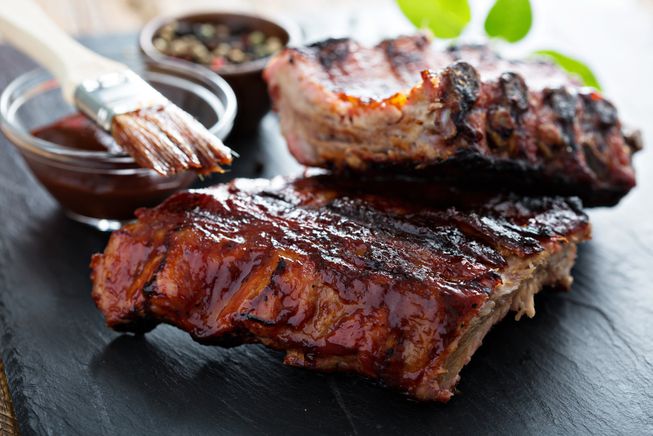However, there are recipes online — all posted by people who know what they're doing — that call for wrapping food in plastic and then cooking it in the oven.
Food Network's Robert Irvine wraps his ribs in plastic wrap and cooks them at 225 degrees Fahrenheit for two hours. The recipe notes that the oven should never go above 250 degrees. Chef Akhtar Nawab, who owns a handful of restaurants in New York City, also wraps his slow roasted wrapped ribs in plastic wrap, cooking them on a low temperature.
A 2013 Thanksgiving turkey recipe in the Washington Post by Lisa King of the reality show "Farm Kings" called for the turkey to be wrapped in plastic wrap and covered in foil before being cooked at 350 degrees.
What's going on here? How is it that the plastic wrap isn't melting in the oven, especially at 350 degrees?
The melting point of plastic wrap
The Washington Post did an explainer piece after the Thanksgiving turkey recipe posted because so many people had questions about the plastic wrap. They spoke with chemistry professor and former Food 101 columnist Robert L. Wolke, who explained that "most home-use plastic wraps won’t melt until 220 to 250 degrees, anyway, depending on the manufacturer." He also suggested contacting the manufacturer to ask. (That information won't be on the box.)
So that explains why the rib recipes work. But what about the turkey that's cooked at 350 degrees? The aluminum foil is the key. Think about when you take a casserole out of the oven that's had aluminum foil on it. You can take the foil off immediately without burning your hands, although you need to watch out for the steam that may escape.
Wolke says the foil "is so thin and insubstantial that it cannot absorb and retain enough heat to get very hot." Although the oven is 350 degrees, the foil itself doesn't get hot enough to melt the plastic.
When I spoke with "Hells Kitchen" contestant Barbie Marshall recently about making the perfect mashed potatoes, she mentioned putting plastic wrap in the oven, too, when explaining how to keep the potatoes hot if they're ready before the rest of the meal.
"You can do plastic if you put foil on top," she said.
"Make sure the mashed potatoes are super hot," said Marshall, "and cover with plastic wrap and then foil. Put them in a warm oven. The plastic keeps the steam inside, and they won't dry out."

Is it safe?
Just because you can use plastic wrap in the oven, does that mean you should use it in the oven? What type of chemicals are in the plastic wrap that can leach into food when it's hot? As of 2006, almost all plastic wraps made for home use have been phthalate-free, according to Dr. Andrew Weil. Phthalates are chemicals used to make plastics pliable that have been linked to many health problems. Low-density polyethylene (LDPE) or polyvinylidene chloride (PVDC) replaced phthalates, but "LDPE may contain diethylhexyl adipate (DEHA), another potential endocrine disruptor that has been linked to breast cancer in women."
Because of this the FDA advises against using plastic wrap in microwaves unless it is labeled "microwave safe." The FDA doesn't have any warnings about using plastic wraps in ovens, most likely because most plastic wrap manufacturers say their products are not oven-safe.
In addition to concerns about plastic wrap leaching chemicals into the foods, there are also the environmental concerns. Plastics last virtually forever in the landfill, so using as little as possible — in any of its forms — is the more environmentally responsible choice.
Source:www.mnn.com







